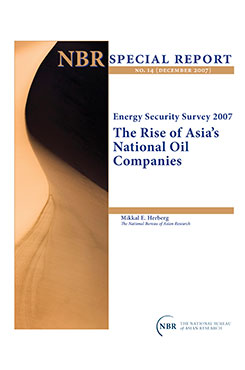NBR Special Report no. 14
Energy Security Survey 2007
The Rise of Asia's National Oil Companies
This report explores the role of national oil companies (NOC) from China, India, and Japan in the energy security strategies of these countries’ governments and assesses the major implications of the NOCs’ global expansion for geopolitics and industry competitiveness.
EXECUTIVE SUMMARY
MAIN FINDINGS
- Government influence and control over NOC investments is complex and nuanced. Increasingly, Asia’s NOCs are behaving autonomously and investing in the same manner as commercially driven international oil companies (IOC).
- China is becoming a significant diplomatic and economic force in virtually all of the major energy-producing regions. India is expanding its reach mainly toward neighboring subregions, reflecting the country’s regional rather than global aspirations. Japan has focused its ambitions on a few key areas, reflecting in part the competitive weakness of Japanese oil companies.
- China and India are the largest potential future markets and sources of inward investment for oil-producing countries in Africa, the Middle East, and Eurasia. Though some NOC investments have expanded economic ties, the corresponding growth of strategic alliances has been limited and will not likely displace the U.S. economic or security presence in these regions.
- Asia’s NOCs do not currently present a major competitive threat to the IOCs, who remain at the top of the industry’s “food chain” because of their technological and managerial expertise. The issue of fair competition may arise, however, due to growing alliances and tied aid between consumer and producer NOCs in some regions.
POLICY IMPLICATIONS
- Policymakers in Asia are beginning to realize that the national pursuit of equity oil supplies does not necessarily serve long-term energy security interests.
- The Asian governments are becoming politically and economically active in the producing regions but the scale and impact varies widely. No simple correlation exists between NOC investments in the producing countries and increasing economic and political influence.
- Though Chinese and Indian NOCs are becoming increasingly commercial and autonomous, the companies will be pressured to continue fulfilling social and employment roles, which will limit profitability, independence, and the ability to respond to commercial motivations.
- “Tamed mercantilism” might reduce the environment of national competition for oil supplies and alleviate the geopolitical tension generated by NOC activities in the future.
- Over the long run Asia’s NOCs will be pressured—by IOCs, host economies, world oil prices, and profit motives—to shift toward a market-oriented pattern of growth and investment.


